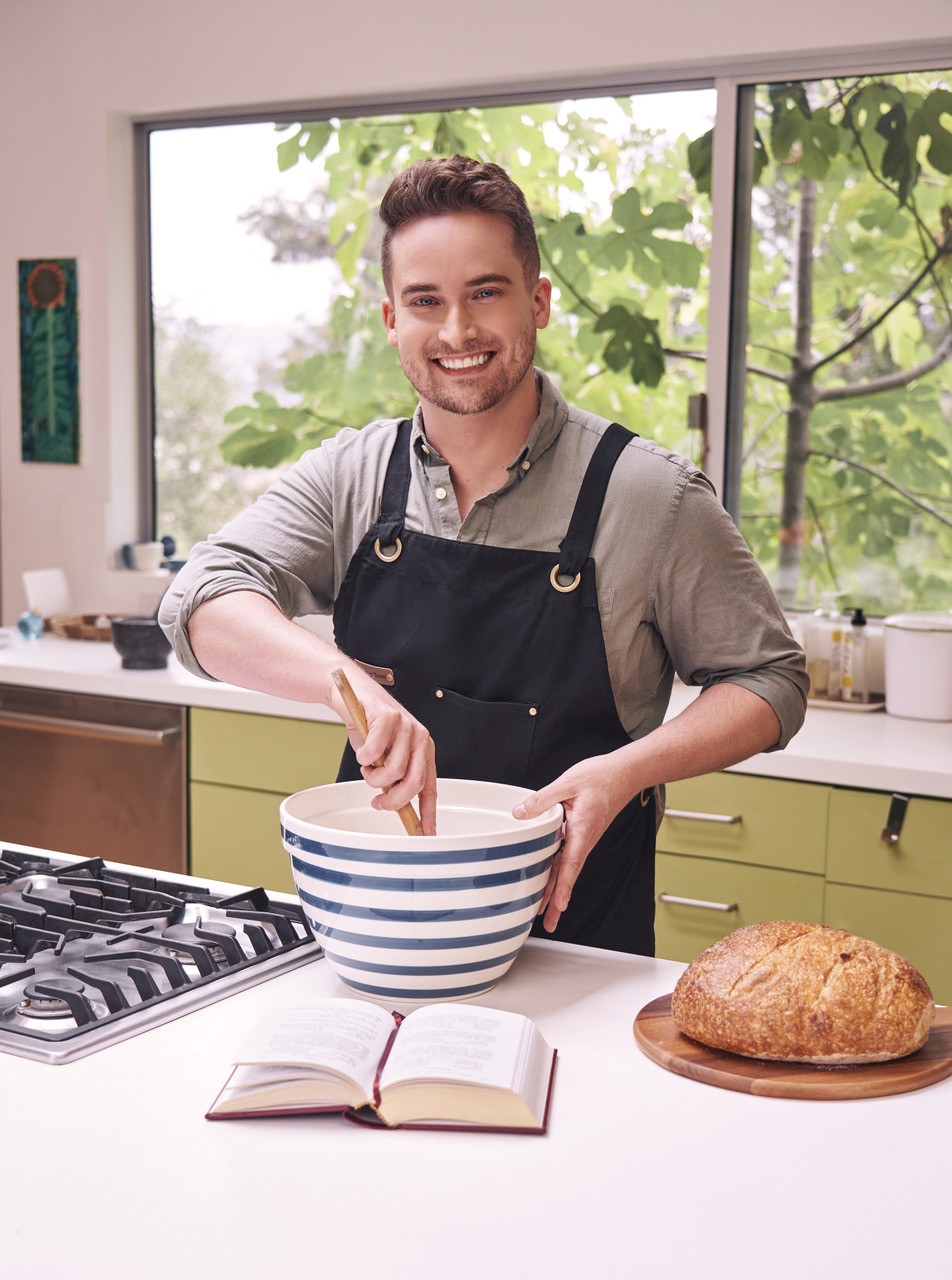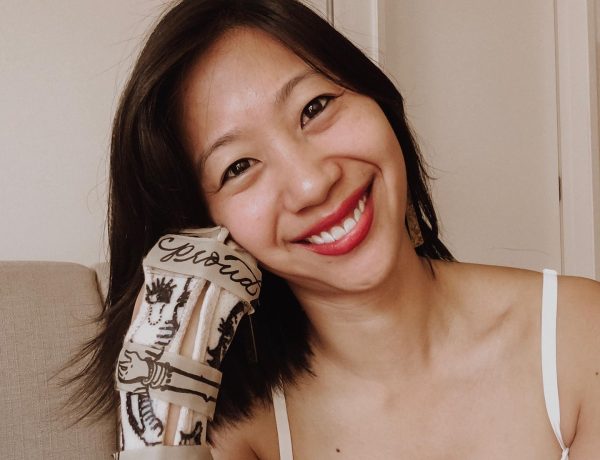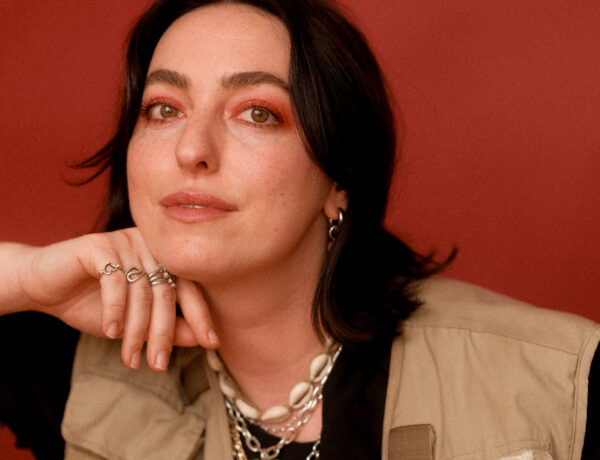Wholesome British television convinced Max Miller to give baking his best shot. “One of the first things that really made the connection [between food and history] for me and actually what got me into cooking was The Great British Bake Off,” he recalls. “In the very early years, my friend introduced me to the show. It used to be a little bit more quaint than it is now. They would have these little educational segments on the show, which sadly they have gotten rid of. They would talk about the history of whatever they were baking. That was the first time that I ever heard of a Sally Lunn bun (one of my favorite episodes now) was on that show. They made the Sally Lunn and they went to Bath and talked about making it. I had never cooked, I had never baked, I had never gone in the kitchen before watching that show. But because it was so charming and it talked about my favorite thing, which is history, I was hooked. I just devoured the episodes, no pun intended. I ended up deciding, ‘I’m going to learn how to bake by baking everything that they’re making on this show.’ And so, over the course of six or seven months, I taught myself how to bake.”
His coworker’s offhand suggestion gave a new dimension to his hobby, as did copious unexpected time off. “I was working at Disney at the time. I would bring these things into work and I would tell people the history of what I was bringing in. At first, it was a history that I was learning from the show, but as I started making more things and improving my baking skills, I would start to look up my own history of things that weren’t on the show. In December of 2019, a friend of mine at work said, ‘You should put this on YouTube. You obviously love talking about this. Maybe it was a way of saying, ‘Go talk to the internet about it and stop bothering us with your lectures,’” he laughs. “So I spent that January deciding on how I would do it. And then in February I made my first episode and put it out. A week later, I was furloughed from Disney because of Coronavirus. So I had nothing to do but work on the channel.” Thus, he found a silver lining within lockdown. “Obviously, it was a scary horrible time for most people, and it was scary and horrible for us too. But this wonderful thing in my life came out of this dark time, which is so often how things happen. When you get bad news, you never know if it’s bad news until much later. You always have to be like, ‘All this is just how it is, and we’ll see and make the most of it.’ I think I made the most of it.”
The rich world of food history soon unfolded decadently in front of him.He has a special affinity for Renaissance cuisine, as it’s reflective of the rapid globalization that was happening contemporaneously. “The Italian renaissance specifically has some of the most fascinating cuisine because they’re still using so much of the medieval flavors, of the highly spiced food of the medieval era. The wealthy people were bringing in spices from the far east and the Middle East. Yet it’s also the time when the new world foods are being introduced and you just start to see glimpses of it, you know, a pumpkin here or squash there. That was the main food that started to find its way. Not potatoes or tomatoes. Corn a little bit. But pumpkin and, and some other chilies, and spiced chocolate. That’s when you start to see these other ingredients and that clash between those new world ingredients and those old world spices. The most important spice in my opinion is sugar. We don’t usually consider that a spice today, but it absolutely was considered a spice then and they used it as a spice. I mean, chocolate and sugar is the most beautiful marriage that has ever happened in human history, in my opinion. I absolutely love that period of those two worlds colliding. And then the opulence of the cuisine on top of that. Most of the recipes that we have from that time are for popes and kings and princes, so we’re only seeing the very top layer of society’s food. But as that is what we’re seeing, it is fantastic. I wouldn’t say that it’s the most fantastic or opulent cuisine of all time, at least in Europe, but some of those dishes are pretty spectacular.”
Food weaves humanity together across space and time. “Food is always with us. Most people never go 12 hours, let alone more than a day, without eating. It’s always part of history. With the exception of clothing, there are very few things that we can always tie into any aspect of history. That’s why sometimes my show is able to focus on the history of food, but then sometimes I veer off and most of an episode is the history of some person and it has nothing to do with food except that this person ate this food. And then I can craft the episode. I can push into whatever historical context I want. It gives me a lot of freedom because of that.” Max delights in incorporating history in all its fanciful forms without sweating the details. “I’m not a historian, which is nice because I am able to use primary sources more as an illustration of the time and in storytelling. Whereas a true historian uses them to contextualize things and tries to step back from what the people on the ground were saying because those sources are often so skewed with people’s own prejudices and whatnot. But I don’t have to to worry about that. It’s just for entertainment purposes only with some education sprinkled in. So I get to use those wonderful newspaper clippings and the writings of people like Pliny the Elder and Gerald of Wales, where you get to hear the voices of the people from the time and it’s just like jumping into their shoes on top of eating what they’re eating. I enjoy getting to use those in the storytelling of the show. I do think a lot of people enjoy those. Actually finding them is definitely one of the harder parts of my job.”
The channel has flourished in the enthusiasm of the community. And, oddly enough, with a boost from fish sauce. “I started the channel at the very end of February and I had March, April, May, and early June. The channel was doing better than I thought. I had shared things on Reddit and Facebook. I had a few thousand subscribers in just a few months, which is pretty great. Then I did a video on garum, which is an ancient Roman fermented fish sauce. I put that video out and it did just as every other video did. It wasn’t anything spectacular for the first few days. I put it out on Tuesday, went home to Phoenix to see my parents. and that Saturday I saw that the video was doing really quite well. And then Sunday hit and it was just an exponential curve. It was insane. Over the next five days, I got a hundred thousand subscribers. After a week, I think it was 150,000 subscribers.” Max then faced the happy conundrum of trying to learn the technical aspects of filming in front of a growing audience. “It was overwhelming, especially after just starting the channel a few months earlier, because I was still learning how to make videos. I had never made videos, so I was still learning the sound and all of this other stuff and having that many people watch was…I go back to those videos and then just cringe. Oh, it’s terrible. But the community was so, so supportive and engaged and would come back week after week. The channel just kept growing. That video had an insane type of growth that I’ve never really achieved again. Now it’s just more of a steady growth. Actually, when the Titanic episodes came out, that was a big period of growth as well.”
The viewers are his primary wellspring of inspiration. “I learn a lot from people sending me ideas. A lot of people watch because they’re interested and that’s it. But a good portion of the people who watch are interested in it because they do this. They are members of the SCA (Society for Creative Anachronism), doing renaissance festivals and things like that where they are into food history.” They also provide a gateway to incredibly niche treasure troves of culinary traditions. “I get to tap into their knowledge about very specific things like Japanese food history and Ukrainian food history. I have a video coming up on borscht. Getting to learn from them has been instrumental to me having videos to make, because I’d say a more than a good quarter of my videos came from somebody saying, ‘Hey, you should look into this topic,’ or, ‘Hey, there’s a really cool story that’s hard to find about this food,’ and then I can follow down the rabbit hole of researching and find it myself, but at least I know it’s out there. They’ve been wonderful.” Such specialized knowledge assists with the research side of things as well. “I have a viewer who is able to read and decipher old Chinese calligraphy, which even somebody who is fluent in Chinese today usually can’t read because the writing style has changed so much. Not just the language, but the actual physical writing style. And he’s able to do that. So when I come across these documents from 17th century, 16th century China, he’s able to look at them. He takes a couple days and then spits right back out at me in English because I don’t speak Mandarin or Cantonese. There are so many videos that I wouldn’t be able to do without my community behind me.”
This group feedback proved immensely beneficial when he was developing his cookbook, Tasting History: Explore the Past through 4,000 Years of Recipes. His Patreon served as an arena for a virtual cooking class of sorts. “They were able to help me test recipes. So instead of me having to make Scappi’s herb torte 20 times to really dial in exactly how to do it and how to explain it to people, I was able to give them the recipe as I’ve done it on the show with some tweaks. And then they would all make it and give me their feedback of, ‘Well, this worked for me, this didn’t work for me, this was unclear.’ I was able to really craft better recipes that way. I think a lot of cookbook authors would just kill to have such a resource, because it takes a lot of time. Working on the channel, I don’t have time to make things twice. I make things once for the show and it’s not perfect and then I move on because I’ve got 40 hours of research to do before next Tuesday. So having them back me up and help me with that was invaluable.” It was also a good reminder to tailor his book to the reader. “Especially in recipe writing, you make assumptions that someone knows what you’re talking about, and so you don’t write it down and they don’t know what you’re talking about. You make assumptions that people will know a certain word or know a technique. Of course you know what folding egg whites into something means, but some people don’t. I had to figure out, how much explanation do I need to give and what level do I want this cookbook to be at? That kind of thing happens in my history sections too. A lot of people will say, ‘I’m confused. This didn’t make any sense.’ And it made perfect sense to me, but I didn’t realize that most people were not familiar with a certain character from history or a certain event.”
The nearly flawless execution of the channel wouldn’t be possible without the tireless support of Max’s husband, Jose (with whom he now shares an extraordinarily delightful secondary channel). “I always try to have Jose read my scripts before I actually film. He’s my sounding board and he does all the subtitles, which is a big thing. It takes him hours and hours every Sunday night going through and writing out every word that I say and spelling it correctly. Our subtitles are top notch.” YouTube is more of a complicated undertaking than Max originally envisioned, but he’s up to the challenge. “When the channel blew up in just a few months, I was still learning so many things, and I’m still learning. Every few months, I’ll notice I figured out a new way to take photographs. My images have gotten better and my sound has gotten better and all these things. I’m having to learn every aspect of making these videos and it’s a lot more complicated than I had realized. Otherwise, I probably wouldn’t have started, so I’m glad I didn’t know how complicated it was.”
He is eagerly anticipating his book release and amping up his content. “My cookbook comes out on April 25th, so that’s going to be a big thing for me and it’s taken up a lot of time. If it does well, I want to make another one, but very different. This one is going to be based on things that I’ve done on the channel. I want something very different, but still focused on historical food. But as for the channel itself, I want to keep putting out a video every week and extra videos when I can hopefully do a little bit more traveling. That way I can learn some cuisine and techniques from other places. I would like to eventually be able to grow the amount of content that I’m putting out, whether that be YouTube shorts or TikTok, and leaning into that in addition to what I’m doing now or starting a podcast that focuses more just on history that isn’t food centric, but just history centric in general.” Max and his community will keep following recipes wherever the history leads them.
Read more Celebrity Interviews on ClicheMag.com
Max Miller Eats His Way Through The Eras On His YouTube Channel, “Tasting History.” Photo Credit: Courtesy of Max Miller.




